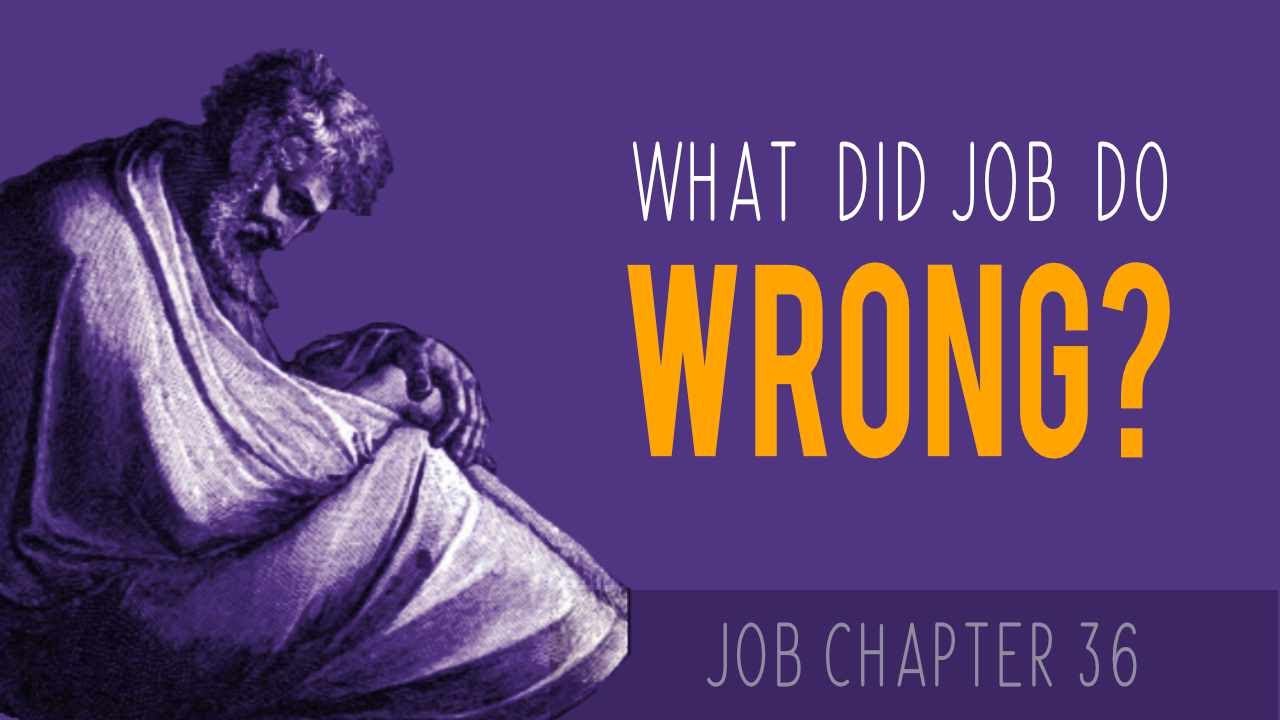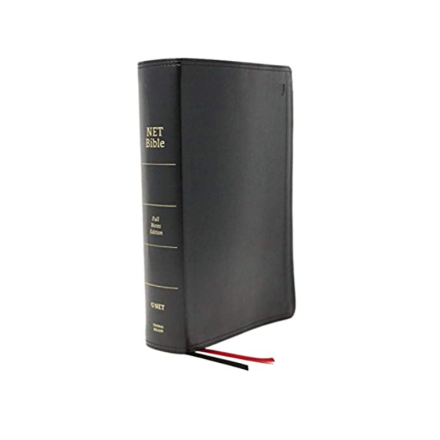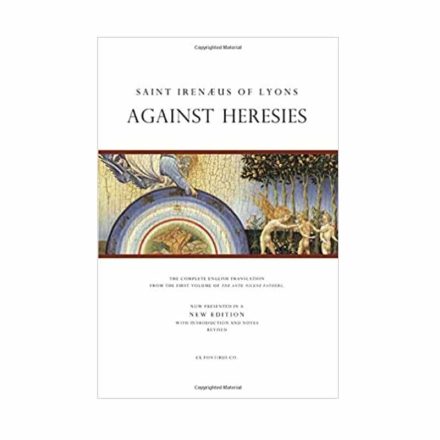Podcast (bible-study): Play in new window | Download | Embed
Subscribe: Apple Podcasts | Google Podcasts | Spotify | Amazon Music | Android | Pandora | iHeartRadio | Podchaser | Email | Deezer | RSS | More
What did Job do wrong?

Through all of the discussion, Job insists that he has not done anything wrong and calls out to God to vindicate him. Job is willing, he says, to repent if God will show him where he is in error. Job starts from a place of despair, believing that there is nothing left for him, but then he begins to push back against the friends’ insistence. Job says that he knows there is one who is acting as a mediator for him, as one would stand for a friend. He insists that he has done no wrong and that he knows his Redeemer lives (Job 19:25) and that he will be vindicated. Finally, he presents his case to God himself in Job chapters 26-31.
His response from God begins with the appearance of Elihu on the scene. Job has asked God to show him where he is in error, and Elihu has some words to say to point out where Job is in error.
Job 36
And Elihu continued, and said:
2 “Bear with me a little, and I will show you,
for I have yet something to say on God’s behalf.
3 I will get my knowledge from afar
and ascribe righteousness to my Maker.
4 For truly my words are not false;
one who is perfect in knowledge is with you.
Elihu tells Job that, unlike the friends who are speaking from their own knowledge and understanding, he is speaking from knowledge that is given to him by God. What is more, Elihu is not taking credit for this, but giving the glory, ascribing righteousness, to God.
5 “Behold, God is mighty, and does not despise any;
he is mighty in strength of understanding.
6 He does not keep the wicked alive,
but gives the afflicted their right.
7 He does not withdraw his eyes from the righteous,
but with kings on the throne
he sets them forever, and they are exalted.
Elihu affirms that God does give the wicked their due. If you remember, back in chapter 24, Job has faith that God will give the wicked their due in the end … in the world to come; however, in his response to Eliphaz, Job points how how the wicked go on without recourse in this life. Elihu is stating that God is a god of justice.
8 And if they are bound in chains
and caught in the cords of affliction,
9 then he declares to them their work
and their transgressions, that they are behaving arrogantly.10 He opens their ears to instruction
and commands that they return from iniquity.11 If they listen and serve him,
they complete their days in prosperity,
and their years in pleasantness.
12 But if they do not listen, they perish by the sword
and die without knowledge.
In this section, Elihu is affirming that problems and trials can be caused by a person’s actions; however, if a person is caught in “the cords of affliction,” God in his mercy will bring a person’s transgressions to their attention, giving them an opportunity to repent. If they do repent, they will “complete their days in prosperity.” If the person refuses to respond to that conviction of the Holy Spirit and repent, they will “perish by the sword and die without knowledge.”
We are accountable for the light we’ve been given. Job was unaware of any wrongdoing on his part, and so he asked God to show him if he had anything that he needed to repent of. Here comes the pivot point. If God shows you, be ready and willing to repent. If you refuse to acknowledge the truth, you are condemning yourself, this is the unforgivable sin … denying the Holy Spirit. What Elihu is saying in verse 12 is the same thing that Jesus says in Matthew 12:
31 Therefore I tell you, every sin and blasphemy will be forgiven people, but the blasphemy against the Spirit will not be forgiven. 32 And whoever speaks a word against the Son of Man will be forgiven, but whoever speaks against the Holy Spirit will not be forgiven, either in this age or in the age to come.[1]
13 “The godless in heart cherish anger;
they do not cry for help when he binds them.
14 They die in youth,
and their life ends among the cult prostitutes.
Whatever the problem, the answer is to call on God for help. Sometimes when we get beat up by life, we get bitter and resentful, we “cherish anger.” This bitterness leads to a separation from God.
15 He delivers the afflicted by their affliction
and opens their ear by adversity.
16 He also allured you out of distress
into a broad place where there was no cramping,
and what was set on your table was full of fatness.
Elihu points out a very important point here, it is what we called “the upside of evil” in a discussion with Zak Schmoll on his book, Disability and the Problem of Evil. Sometimes God brings us to the place we need to be through the very affliction that we are calling on him to be delivered from.
Think of the story of Joseph. If Joseph had never been sold into slavery, he likely never would have been in the land of Egypt. If he hadn’t been accused of assaulting Potiphar’s wife, he probably never would have been in the prison where pharaoh’s servants were held. If Joseph hadn’t heard and interpreted the dreams of pharaoh’s servants, he would have never been brought to the attention of pharaoh. If Joseph hadn’t interpreted pharaoh’s dream, the entire region would have been devastated through the coming famine. If Joseph hadn’t had such a dysfunctional family, he would have been taking care of his father’s flocks when the famine hit and the family, the line of Abraham from which the savior of the world was to come, would have ended.
It was a long hard road for Joseph, he too was a foreshadowing of Christ as “the Suffering Servant,” but in the end, many were saved. Joseph, the afflicted, was delivered by his affliction, not in spite of it. Joseph was brought out of his distress and into a “broad place.” This is who God is as Elihu states.
17 “But you are full of the judgment on the wicked;
judgment and justice seize you.18 Beware lest wrath entice you into scoffing,
and let not the greatness of the ransom turn you aside.
19 Will your cry for help avail to keep you from distress,
or all the force of your strength?
“Judgment and justice seize you,” that’s an interesting statement isn’t it? I think this is where we see the root of what is keeping Job’s deliverance at bay. Elihu says that Job is “full of the judgment on the wicked.” Job sees the wicked around him who seemingly do not have any problems in life. He is trusting God to bring justice in the hereafter, but he doesn’t think anything is going to be done in this life. As far as earthly occurrences, Job has more faith in his own idea of justice and the timeline for it.
Job doesn’t see that there is any benefit to a person who obeys and follows God in this life. If that is the case, then that puts Job as the righteous one, that his goodness is coming from himself rather than as a response to the goodness of God. Elihu says, that is not so and points out that Job is sitting in his own self-righteousness.
There is always this tension between waiting on God and taking action, between accepting God’s grace and abiding in him and walking out that righteousness that he enables in us. It is so easy to go from acting in the power of the Holy Spirit to walking in our own will in what we think of as right and pleasing to God. We can stay in that space for awhile before we realize that it is self-generated rather than God-inspired.
But then disaster struck, and Job had to really get to know the God he said he had served before. By the time we first heard Job in chapter 3, he thought his life was over. He was continuing to place his trust in God, but the trust was not for this life … he thought there was no redemption for him in this life … his only hope was for the next. What I think was going on with Job was that he was coming to a point where it was almost as if he thought he was doing God a favor, that Job was honoring God in spite of what God had allowed to happen to him. This is where Elihu is checking Job.
When Elihu says “judgment and justice seize you,” I think he is saying that Job has determined in his mind what justice is and how it should be brought about. In his mind, judgment should be falling on those wicked who seem to be getting away with it. Job wants justice now. How can it be fair that Job is experiencing all the things that he has when the unrighteous seem to go unscathed?
We cannot forget God’s mercy. As I mentioned earlier in this study of Job, I think that what opened to door to the attacks on Job was his children. We learned in the first chapter that Job would always make a sacrifice for them after they had their get-togethers in case they had unwittingly sinned. The first loss Job suffered was that of his livestock, the thing that he would have used to make that sacrifice. The losses hit all at once, while the children were still feasting, before Job would have had the opportunity to make atonement. There was a small window of opportunity where God was not extending that hedge of grace that he had in the past, and Satan took advantage.
It’s reasonable to think that there could have been those same windows of opportunity all along, but God had placed a “hedge” around Job, protecting him until that offering could be made to cover the sin.
Job wanted immediate justice, but yet … he himself very likely had the mercy of a delay … a time for repentance.
Answering this same question, “why doesn’t God punish the wicked more quickly?” the apostle Peter makes it clear that this delay is the grace of God.
The Lord is not slow to fulfill his promise as some count slowness, but is patient toward you, not wishing that any should perish, but that all should reach repentance.[2]
Job has made a judgment, not only against the wicked but against God himself. Job has suffered, the wicked aren’t, that isn’t the way things should be and God apparently isn’t doing it right. At any point in all of these chapters, have you seen any of the friends or Job pray for mercy for the wicked and ask that God grant them the grace to repent? Do you see anything like Jesus’s words on the cross, “forgive them, they don’t even know what they’re doing.[3]”
Job has gotten to know the God he serves through his trials; however, he still does not have the lens or the heart of God for the rebels. This anger, this desire for swift and brutal judgment is what is holding Job in his desolation. It is as Jesus said in Matthew 7 in that very misunderstood passage:
“Judge not, that you be not judged. 2 For with the judgment you pronounce you will be judged, and with the measure you use it will be measured to you.[4]
Jesus is not saying that we cannot say that an action or a thing is wrong, we must do that. What he is saying that if you condemn someone and decide they should be punished, you will be held to the same standard of justice that you are demanding they be held to. This is not about the rightness or wrongness of an action, that is set by God and cannot be changed. This is about mercy and grace, that they (and we ourselves) are given time and the willingness to repent.
It is about being in agreement with God and alignment with his will, the one who “does not want any to perish but all to come to repentance.” It is being that mediator that Job himself wished for, one that that will intercede for others “as one does for a friend” as Jesus told his followers to pray, “forgive us our trespasses as we forgive those who trespass against us.[5]”
20 Do not long for the night,
when peoples vanish in their place.
21 Take care; do not turn to iniquity,
for this you have chosen rather than affliction.
Elihu is telling Job not to long for death, and that desiring death rather than living through this affliction he is facing right now is a sin. In doing this, Job is turning “to iniquity.”
22 Behold, God is exalted in his power;
who is a teacher like him?
23 Who has prescribed for him his way,
or who can say, ‘You have done wrong’?24 “Remember to extol his work,
of which men have sung.
25 All mankind has looked on it;
man beholds it from afar.26 Behold, God is great, and we know him not;
the number of his years is unsearchable.
27 For he draws up the drops of water;
they distill his mist in rain,
28 which the skies pour down
and drop on mankind abundantly.29 Can anyone understand the spreading of the clouds,
the thunderings of his pavilion?
30 Behold, he scatters his lightning about him
and covers the roots of the sea.31 For by these he judges peoples;
he gives food in abundance.
32 He covers his hands with the lightning
and commands it to strike the mark.
33 Its crashing declares his presence;
the cattle also declare that he rises.
Elihu transitions now into highlighting the greatness of God. He describes the wonders and majesty of creation, which are just a slight reflection of the greatness and majesty of who God himself is. He says there is no one like God and who can tell God the way things should be done or that he has done wrong.
Elihu finishes his speech in the next chapter, chapter 37, which we will cover next week. Take this pause to consider if there are situations where, like Job, that you have judged God thinking that he hasn’t taken care of the circumstances in the way that he should.
Reflect on that, give it over to God, and acknowledge that God … not you … knows that perfect plan.
This Bible study is part of A Study of Job (2021)




